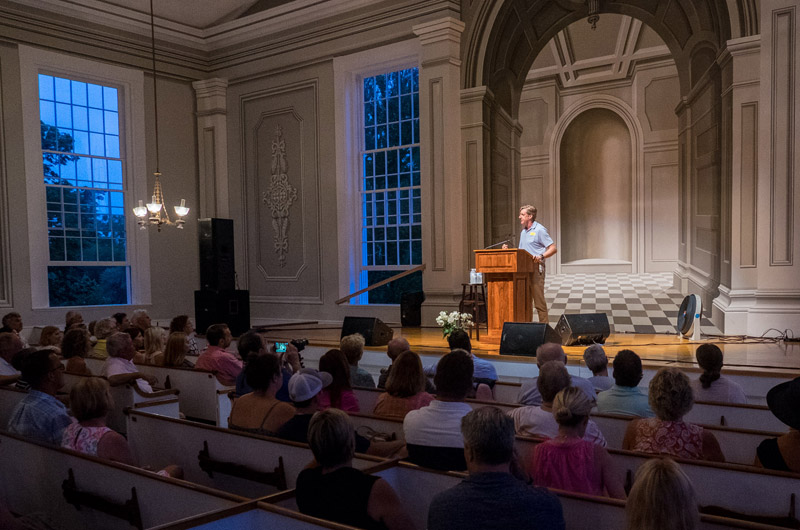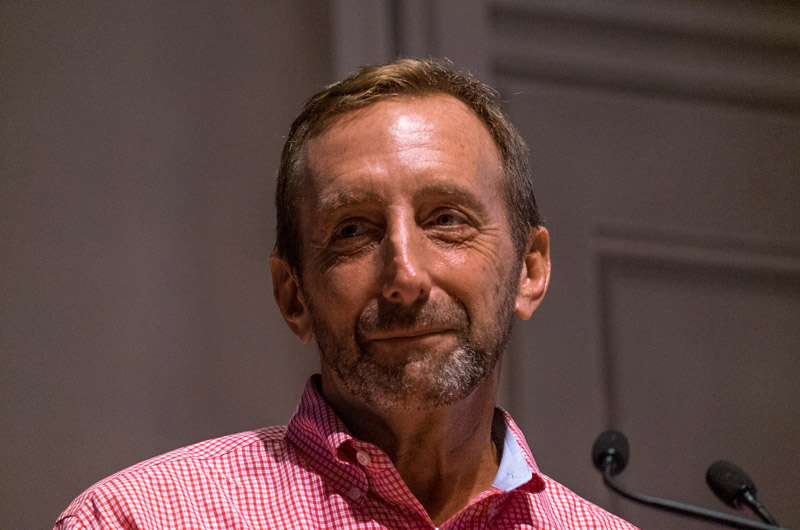Patrick J. Kennedy stood at the podium of the Old Whaling Church in Edgartown on Friday night. It was a sweltering evening and the audience fanned themselves with programs and leaflets while listening to Mr. Kennedy speak from both a place of personal experience about his battles with addiction, and a political perspective as he fights to eliminate the stigma surrounding addiction and mental health issues.
Mr. Kennedy’s talk was a benefit for the Joseph Jerome Memorial Fund and the Martha’s Vineyard Community Services’ New Paths Recovery Program. Founded in memory of Joseph E. Jerome, who passed away at age 24 from Crohn’s Disease, the Jerome Fund raises money to support families on the Island whose children are hospitalized off-Island. The New Paths Recovery Program is an outpatient rehabilitative program for adults suffering from addiction.
During his 16 years as a member of the U.S. House of Representatives, Mr. Kennedy became a leading advocate in the fight against discrimination of those suffering from mental illness or addiction. When he was a teenager, he was diagnosed with bipolar disease and social anxiety, and later alcoholism. He was elected to Congress at age 21, not because of his last name, he assured the audience with a smile, but because of his “good looks and charm.”
Mr. Kennedy helped pass the Mental Health Parity and Addiction Equity Act in 2008, which requires insurance industries to cover patients with mental illness and addiction in the same way they would other illnesses. He decided not to seek reelection in 2010, and has since founded the Kennedy Forum, co-founded One Mind for Research, and co-wrote A Common Struggle.
Mr. Kennedy began his talk by explaining that the “common struggle” is not only the illness or addiction itself and the effects it has on the patient and loved ones, but it is the societal stigmas against the illness and the insurance industry’s failure to abide by the Parity Act.
“I write about the common struggle as the silence that goes hand in hand with suffering from these illnesses,” he said.
Mr. Kennedy refrained from telling “juicy Kennedy stories,” and instead focused on the issue that has been his driving concern. With 41,000 suicides in the U.S. each year alone and approximately the same number of deaths by overdoses, and the life expectancy rate in our country flattening despite modern medicine, Mr. Kennedy said he does not have time to worry about whether certain topics make people squeamish.
“I don’t care if it’s going to take us another 10, 15, 20 years for us to finally have an enlightened society where we understand that the brain is part of the body and, yes, that brain sometimes doesn’t work very well. I don’t have time for that.”
Mr. Kennedy said he also feels pressed for time because of President Obama’s waning time in office. Though President Obama created the Parity Task Force and made the Parity Act the law, Mr. Kennedy feels there has been a lack of the enforcement necessary to hold the insurance companies accountable. According to Mr. Kennedy, this lack of enforcement allows insurance industries to find countless ways to deny patients access to proper care for mental illness and addiction.
Mr. Kennedy believes that it is not too late for President Obama to help the public health epidemic once and for all.
“The President has the opportunity to do more to make history and do more to advance the cause of mental health than any other President in American history in the next two months if he requires insurance companies to disclose how they make medical management decisions,” he said.
Mr. Kennedy said he is creating a legal team that will eventually develop a tracker to record denials and transactions between insurance companies and families. He compared it to NORAD or a mental health equivalent of the NAACP.
“We need to put pressure on insurance agencies. The only way anyone ever got anything in this world is if they fought for it. It’s true of any cause and it’s going to be true of this cause. All I’m saying, my friends, is that there is a simple solution to this: treat it like other illnesses, with the same urgency and expecting the same set of services.”
Island photograpner Michael Blanchard introduced Mr. Kennedy at the beginning of the program. Mr. Blanchard told his own story of recovery, in which he found a way out through creativity. Taking pictures became his therapy.
“It just set me free,” Mr. Blanchard said.
During Mr. Kennedy’s talk, a baby started crying in the back of the church. Mr. Kennedy smiled and said that he likes hearing a baby cry, because it reminds him of his own four babies. He then addressed Mr. Blanchard in the audience.
“Michael, we’re blessed to have babies, aren’t we? To be sober and to be the kind of person they need us to be. That’s because of recovery.”






Comments (1)
Comments
Comment policy »